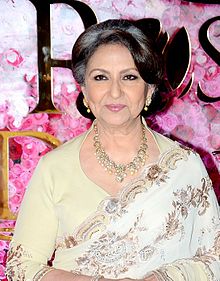| Sharmila Tagore | |
|---|---|
| Begum Mother of Pataudi | |
 Tagore at an event for Lux in 2016 | |
| Begum Consort of Pataudi | |
| Titular | 1968–1971 |
| Predecessor | Sajida Sultan |
| Successor | Kareena Kapoor Khan |
| Born | 8 December 1944 Cawnpore, United Provinces, British India (present-day Kanpur, Uttar Pradesh, India) |
| Other names | Begum Ayesha Sultana[1] |
| Occupation | Actress |
| Years active | 1959–2010 2023–present |
| Spouse | |
| Children | 3 (inc. Saif, Saba and Soha) |
| Family | |
| Awards | Padma Bhushan |
Sharmila Tagore, (born 8 December 1944) also known by her married name as Begum Ayesha Sultana[1] is an Indian actress primarily known for her work in Hindi and Bengali films. Regarded among the greatest actresses in the history of Indian cinema, she is known for portraying both traditional and modern women.[2][3] Tagore is a recipient of two National Film Awards, a Filmfare Award and the Filmfare Lifetime Achievement Award. In 2013, the Government of India, honoured her with Padma Bhushan, India's third highest civilian honour for her contributions to Indian culture through performing arts.[4]
Born into the prominent Tagore family, one of the leading families of Calcutta and a key influence during the Bengali Renaissance, Tagore made her acting debut at age 14 with Satyajit Ray's acclaimed Bengali epic drama The World of Apu (1959). She went on to collaborate with Ray on numerous other films, including Devi (1960), Nayak (1966), Aranyer Din Ratri (1970), and Seemabaddha (1971); thus establishing herself as one of the most prominent figures in Bengali cinema.
Tagore's career further expanded when she ventured into Hindi films with Shakti Samanta's romance Kashmir Ki Kali (1964). She established herself as one of the leading actresses of Hindi cinema with films like Waqt (1965), Anupama (1966), An Evening in Paris (1967), Aamne Saamne (1967), Satyakam (1969), Aradhana (1969), Safar (1970), Amar Prem (1972), Daag (1973), Avishkaar (1974), Chupke Chupke (1975), Mausam (1975), and Namkeen (1982). She won the Filmfare Award for Best Actress for Aradhana and the National Film Award for Best Actress for Mausam. This was followed by intermittent film appearances in the subsequent decades, including in Mira Nair's Mississippi Masala (1991) and Goutam Ghose's Abar Aranye (2002), which won her the National Film Award for Best Supporting Actress, and in the Hindi films Aashik Awara (1993), Mann (1999), Viruddh (2005), Eklavya: The Royal Guard (2007), and Break Ke Baad (2010). Following a hiatus of 13 years, she made her film comeback with the drama Gulmohar (2023).
Apart from acting, Tagore has also served as the chairperson of the Central Board of Film Certification from October 2004 to March 2011. In December 2005, she was chosen as a UNICEF Goodwill Ambassador.[5] She was married to cricketer and the Nawab of Pataudi, Mansoor Ali Khan Pataudi, with whom she had three children—actors Saif and Soha, and jewellery designer Saba.
- ^ a b "Sharmila changed her name to Ayesha Sultana to marry Mansoor Ali Khan Patuadi". The Times of India. TNN. 25 February 2015. Archived from the original on 28 February 2023. Retrieved 8 March 2023.
- ^ Cite error: The named reference
aheadoftimewas invoked but never defined (see the help page). - ^ Cite error: The named reference
TheTagorewas invoked but never defined (see the help page). - ^ "Sharmila Tagore, India's emblem at Cannes". The Times of India. Archived from the original on 19 July 2018. Retrieved 17 December 2021.
- ^ "Sharmila Tagore, for UNICEF". Rediff.com. 8 December 2005. Archived from the original on 1 February 2009. Retrieved 3 September 2006.